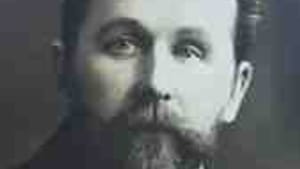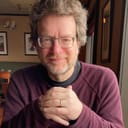Stay in the Loop
BSR publishes on a weekly schedule, with an email newsletter every Wednesday and Thursday morning. There’s no paywall, and subscribing is always free.
The world forgot, but I remembered
In search of a forgotten composer

I've come to this nondescript New Jersey spot to find the grave of a largely forgotten Russian composer. Standing in front of a Russian Orthodox church on a hill, I'm looking at an egg sitting on the base of his gravestone. But where exactly am I?
This isn't South Jersey. It's not the Pines. It's not the suburbs, although I see housing tracts floating among the horse farms and tree farms. Every once in a while I pass a lake that's quiet and pretty and alone.
I don't see people, but there must be people, with children enough, to judge by the "School Bus Stop Ahead" signs among the few houses bobbing within the waves of eastern white pine and white oak and pitch pine and thin, wild rhododendron that lap against the banks of the roads running through them.
I come from well below here, two miles from where the Delaware River shoulders into Philadelphia's Port Richmond, nestled in Coolidge-era housing separated by small, reckless highways designed for slower cars, separated by industrial parks producing ink resins and truck parts. To me, this composer's grave lies in that unknown swath between Fort Dix and Freehold, say, between Lakehurst and the waist of New Jersey just below Trenton. It's not on the way to anything— not the Shore, not the Pines, not New York. It's where a road connects two towns and the name of the road is the name of the two towns— that is, if they don't just call it by its three-digit county number. You wouldn't go here unless you knew somebody, and I never did.
I have come a long way to find the grave of Alexander Gretchaninoff (1864-1956). What on earth is he doing here? What am I doing here?
One Saturday in high school
I rode my bike in this direction once, to see how far from my South Jersey home I could go. I didn't know where I was heading, but I knew it was in this direction. It was that long desperate Saturday that finds each of us, when we realize we won't be in high school much longer, when we know that something needs to happen.
I wanted to compose music then but didn't know how, didn't know anything. I pedaled my one-speed all the way to Moorestown's leafy Main Street— already far— and kept going, to where it turns into the sun-baked Marne Highway skirting the freight tracks, and farther, pushing in the direction of Newfoundland, for all I knew. Where did I think I was going? Reaching the Rancocas, exhausted, I lay on my back on the grass under silver maples by the creek. I couldn't think. The sun sparkled through the leaves.
That was almost 40 years ago. I soon left for Philadelphia. And now I've come here to find Alexander Gretchaninoff.
A little help from the Tsar
As composers go Gretchaninoff was never in style. Fashions came and went-- Scriabin, Prokofiev, Stravinsky early, middle, late— but Gretchaninoff was a 19th-Century Romantic. As a consequence, or because he wrote religious music as if it meant so much it hurt, or because of a hundred other reasons—he had no money.
The Tsar gave him a salary, but the Revolution took the Tsar away and then the Revolution took the salary away. Gretchaninoff moved to Paris, then to New York. The Philadelphia Orchestra played his Fifth Symphony— his last symphony. He became an American citizen.
Friends gave concerts of his music to support him, talked famous people into performing his music, gave him envelopes with cash so that he wouldn't starve. Then, the year I was born, Gretchaninoff died at the age of 91, and the church buried him here, in his new home.
I should know him. I should know this place, wherever it is. I should know so many things.
Why Jews leave stones
An egg is left on a grave at Russian Orthodox Easter to symbolize the Resurrection and eternal life. Jews leave stones on graves, I've heard, perhaps for the same reason they piled up stones at Gilgal after 40 years in the wilderness, after crossing the river on dry ground into Canaan— so that someone would know they were there.
I see the egg sitting on the base of Gretchaninoff's gravestone, and I know that someone was here.
Someone is here.
Gretchaninoff made it halfway around the world. I never made it past Rancocas. But I compose now, and I've found Alexander Gretchaninoff. He's been waiting for me. To me, it feels like home here.
Cruising speed
I walk back to the parking lot, over the spiky hard grass that shines in the sandy coastal plain, to my car, parked under the trees where it's cool. Driving home, I keep to the three-digit county roads, not too soon crossing back into Pennsylvania. I'm in no hurry. A state, a grave, eggs and stones and wildernesses and bright Canaan are all my home.
And somewhere approaching New Egypt I feel that I'm not driving, but that the car is running, like the way they say a ship runs, running along a channel, parting the waves, floating me west. And through the pines and rhododendron I trail a silver Maxima that slowly pulls away, and I'm running, floating over the macadam that sparkles.
Yes, there is a kind of macadam that sparkles sometimes. Perhaps you've seen it.
This isn't South Jersey. It's not the Pines. It's not the suburbs, although I see housing tracts floating among the horse farms and tree farms. Every once in a while I pass a lake that's quiet and pretty and alone.
I don't see people, but there must be people, with children enough, to judge by the "School Bus Stop Ahead" signs among the few houses bobbing within the waves of eastern white pine and white oak and pitch pine and thin, wild rhododendron that lap against the banks of the roads running through them.
I come from well below here, two miles from where the Delaware River shoulders into Philadelphia's Port Richmond, nestled in Coolidge-era housing separated by small, reckless highways designed for slower cars, separated by industrial parks producing ink resins and truck parts. To me, this composer's grave lies in that unknown swath between Fort Dix and Freehold, say, between Lakehurst and the waist of New Jersey just below Trenton. It's not on the way to anything— not the Shore, not the Pines, not New York. It's where a road connects two towns and the name of the road is the name of the two towns— that is, if they don't just call it by its three-digit county number. You wouldn't go here unless you knew somebody, and I never did.
I have come a long way to find the grave of Alexander Gretchaninoff (1864-1956). What on earth is he doing here? What am I doing here?
One Saturday in high school
I rode my bike in this direction once, to see how far from my South Jersey home I could go. I didn't know where I was heading, but I knew it was in this direction. It was that long desperate Saturday that finds each of us, when we realize we won't be in high school much longer, when we know that something needs to happen.
I wanted to compose music then but didn't know how, didn't know anything. I pedaled my one-speed all the way to Moorestown's leafy Main Street— already far— and kept going, to where it turns into the sun-baked Marne Highway skirting the freight tracks, and farther, pushing in the direction of Newfoundland, for all I knew. Where did I think I was going? Reaching the Rancocas, exhausted, I lay on my back on the grass under silver maples by the creek. I couldn't think. The sun sparkled through the leaves.
That was almost 40 years ago. I soon left for Philadelphia. And now I've come here to find Alexander Gretchaninoff.
A little help from the Tsar
As composers go Gretchaninoff was never in style. Fashions came and went-- Scriabin, Prokofiev, Stravinsky early, middle, late— but Gretchaninoff was a 19th-Century Romantic. As a consequence, or because he wrote religious music as if it meant so much it hurt, or because of a hundred other reasons—he had no money.
The Tsar gave him a salary, but the Revolution took the Tsar away and then the Revolution took the salary away. Gretchaninoff moved to Paris, then to New York. The Philadelphia Orchestra played his Fifth Symphony— his last symphony. He became an American citizen.
Friends gave concerts of his music to support him, talked famous people into performing his music, gave him envelopes with cash so that he wouldn't starve. Then, the year I was born, Gretchaninoff died at the age of 91, and the church buried him here, in his new home.
I should know him. I should know this place, wherever it is. I should know so many things.
Why Jews leave stones
An egg is left on a grave at Russian Orthodox Easter to symbolize the Resurrection and eternal life. Jews leave stones on graves, I've heard, perhaps for the same reason they piled up stones at Gilgal after 40 years in the wilderness, after crossing the river on dry ground into Canaan— so that someone would know they were there.
I see the egg sitting on the base of Gretchaninoff's gravestone, and I know that someone was here.
Someone is here.
Gretchaninoff made it halfway around the world. I never made it past Rancocas. But I compose now, and I've found Alexander Gretchaninoff. He's been waiting for me. To me, it feels like home here.
Cruising speed
I walk back to the parking lot, over the spiky hard grass that shines in the sandy coastal plain, to my car, parked under the trees where it's cool. Driving home, I keep to the three-digit county roads, not too soon crossing back into Pennsylvania. I'm in no hurry. A state, a grave, eggs and stones and wildernesses and bright Canaan are all my home.
And somewhere approaching New Egypt I feel that I'm not driving, but that the car is running, like the way they say a ship runs, running along a channel, parting the waves, floating me west. And through the pines and rhododendron I trail a silver Maxima that slowly pulls away, and I'm running, floating over the macadam that sparkles.
Yes, there is a kind of macadam that sparkles sometimes. Perhaps you've seen it.
Sign up for our newsletter
All of the week's new articles, all in one place. Sign up for the free weekly BSR newsletters, and don't miss a conversation.
 Kile Smith
Kile Smith